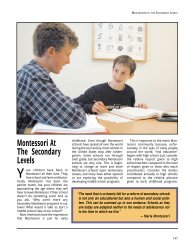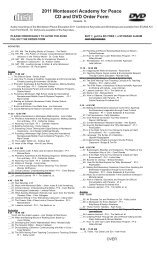Tim Seldin & Paul Epstein Ph.D. An Education for Life
Tim Seldin & Paul Epstein Ph.D. An Education for Life
Tim Seldin & Paul Epstein Ph.D. An Education for Life
You also want an ePaper? Increase the reach of your titles
YUMPU automatically turns print PDFs into web optimized ePapers that Google loves.
is nothing wrong with law, medicine, teaching, carpentry, or<br />
any other career, as long as it is what is right <strong>for</strong> the individual.<br />
If the answer to the question of whether or not Montessori<br />
prepares children <strong>for</strong> the real world is to be judged by<br />
whether or not great percentages of Montessori students pursue<br />
professional careers, then the answer is maybe. If the<br />
answer to the question is to be judged by whether or not<br />
Montessori prepares children <strong>for</strong> life, then the answer is<br />
unequivocally yes.<br />
As a parent I set very high expectations <strong>for</strong> my children. I<br />
expected them to be well prepared academically so that they<br />
would be able to follow their dreams wherever that may take<br />
them, but I also hoped that they would be able to make<br />
responsible choices. I also hoped that they would be able to<br />
retain the love of learning and creativity that Montessori nurtured<br />
in them. Although I cared about academics, I felt certain<br />
that my children would achieve similar results from any good<br />
school, Montessori or otherwise. For me, the true value of a<br />
Montessori education went beyond academics.<br />
I have often wished that I had attended a Montessori school<br />
as a child. Things might have turned out differently. For one<br />
thing, I might have saved a lot of money on law school. I really<br />
do believe, however, that all learning experiences have<br />
value and that my years in law school were not wasted. <strong>An</strong>d<br />
maybe a bit of Montessori did rub off on me after all. At the<br />
age of thirty-five, I quit the practice of law to pursue other<br />
interests that I find much more fulfilling — career paths I<br />
probably should have explored in the first place, if I had not<br />
been trying so hard to jam my “round-pegged” personality<br />
into a square professional hole.<br />
When I announced that I wasn’t going to practice law any<br />
more, the initial overwhelming response was, “What do you<br />
mean you’re not going to practice law? How do you think<br />
you’re going to survive without a profession?” Sound familiar?<br />
I hope that as parents we will have the courage to recognize<br />
and continue to support the human values and life lessons<br />
that children learn in Montessori classrooms every day. My<br />
own two children went to good colleges, are now in graduate<br />
school, and seem destined to find satisfaction in their careers<br />
and adult lives. Our world could probably use a lot more<br />
Montessori lawyers, politicians, and doctors who understand<br />
that there’s more to life than being “book smart.” Above all,<br />
though, I think that as parents and educators, we must never<br />
accept the premise that our primary objective must be to<br />
teach children to survive life. Better we should help them<br />
learn to celebrate it!<br />
— Joyce St. Giermaine, Executive Director of<br />
The Montessori Foundation and<br />
Editor of Tomorrow’s Child Magazine<br />
DOES MONTESSORI PREPARE CHILDREN FOR THE REAL WORLD?<br />
My experience with students who leave<br />
the Montessori classroom is that they<br />
keep the Montessori philosophy with<br />
them <strong>for</strong>ever and use what they learned in life. I<br />
have received feedback from students, parents,<br />
and high schools that our students do well in<br />
high school, colleges, universities, and in their<br />
chosen job fields.<br />
Academically, they are well prepared, know how<br />
to learn, and enjoy learning. Since Montessori<br />
offers many different learning styles, students have<br />
acquired the ability to use all modalities, which<br />
allows many options and choices <strong>for</strong> them. Our<br />
students are pursuing the math and science fields<br />
by winning high school awards and majoring in<br />
these areas in college and universities. They can<br />
take a long-term project and break it down into<br />
“do-able” parts, and they see assessments as feedback<br />
and want to correct their test vs. just get a<br />
grade. Personally, they are self-confident and know<br />
themselves well — their strengths and weakness,<br />
which allows them to make knowledgeable decisions.<br />
They are not afraid to take calculated risks in<br />
pursuing new interests.<br />
Socially, they care about others, know how to<br />
work well in groups, consider the opposite sex as<br />
friends, are student leaders, start new service<br />
organizations, participate in global projects, and<br />
are activists. They are the ones who organize petitions<br />
and are willing take a stand on moral issues<br />
— not only <strong>for</strong> their own particular causes but also<br />
<strong>for</strong> larger causes, such as discrimination and religious<br />
preference, which may not affect them personally.<br />
By doing what is best <strong>for</strong> students at each<br />
plane of development, Montessori prepares them<br />
<strong>for</strong> the future, because they have developed the<br />
ability to be adaptable and flexible to what is next in<br />
their life.<br />
— Elisabeth Coe, <strong>Ph</strong>.D., Past-President of<br />
The American Montessori Society;<br />
Faculty Member and Principal of School of<br />
The Woods, Houston, TX, and Executive Director of<br />
The Houston Montessori Center<br />
215




